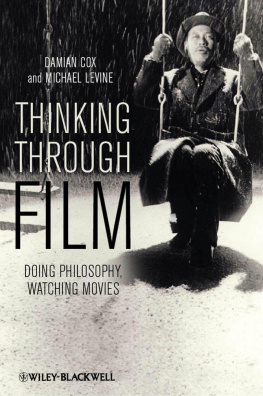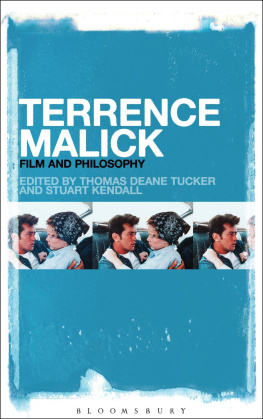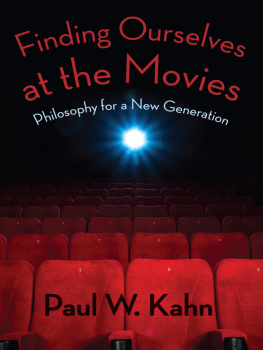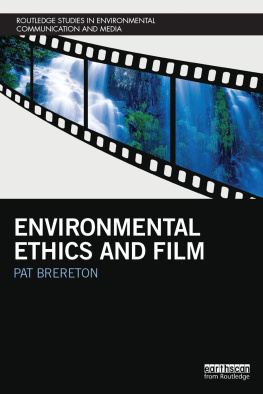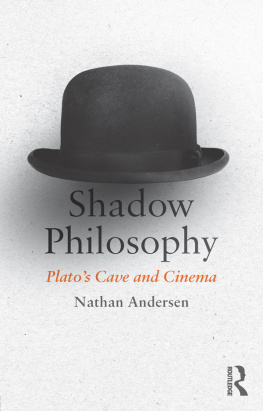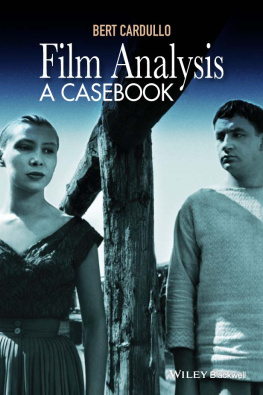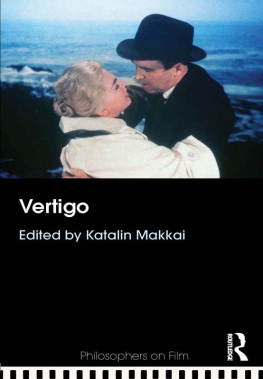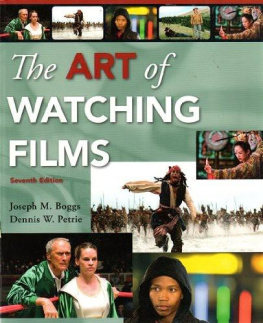Table of Contents
This edition first published 2012
2012 Damian Cox and Michael P. Levine
Blackwell Publishing was acquired by John Wiley & Sons in February 2007. Blackwells publishing program has been merged with Wileys global Scientific, Technical, and Medical business to form Wiley-Blackwell.
Registered Office
John Wiley & Sons Ltd, The Atrium, Southern Gate, Chichester, West Sussex, PO19 8SQ, United Kingdom
Editorial Offices
350 Main Street, Malden, MA 02148-5020, USA
9600 Garsington Road, Oxford, OX4 2DQ, UK
The Atrium, Southern Gate, Chichester, West Sussex, PO19 8SQ, UK
For details of our global editorial offices, for customer services, and for information about how to apply for permission to reuse the copyright material in this book please see our website at www.wiley.com/wiley-blackwell.
The right of [Damian Cox and Michael P. Levine to be identified as the authors of Thinking Through Film: Doing Philosophy, Watching Movies has been asserted in accordance with the UK Copyright, Designs and Patents Act 1988.
All rights reserved. No part of this publication may be reproduced, stored in a retrieval system, or transmitted, in any form or by any means, electronic, mechanical, photocopying, recording or otherwise, except as permitted by the UK Copyright, Designs and Patents Act 1988, without the prior permission of the publisher.
Wiley also publishes its books in a variety of electronic formats. Some content that appears in print may not be available in electronic books.
Designations used by companies to distinguish their products are often claimed as trademarks. All brand names and product names used in this book are trade names, service marks, trademarks or registered trademarks of their respective owners. The publisher is not associated with any product or vendor mentioned in this book. This publication is designed to provide accurate and authoritative information in regard to the subject matter covered. It is sold on the understanding that the publisher is not engaged in rendering professional services. If professional advice or other expert assistance is required, the services of a competent professional should be sought.
Library of Congress Cataloging-in-Publication Data
Cox, Damian.
Thinking through film : doing philosophy, watching movies / Damian Cox, Michael P. Levine.
p. cm.
Includes bibliographical references and index.
ISBN 978-1-4051-9343-6 (hardcover : alk. paper) ISBN 978-1-4051-9342-9 (pbk. : alk. paper)
1. Motion picturesPhilosophy. I. Levine, Michael P. II. Title.
PN1995.C682 2011
791.4301dc22
2011012210
A catalogue record for this book is available from the British Library.
This book is published in the following electronic formats: ePDFs 9781444343816; ePub 9781444343823; mobi 9781444343830
Preface
This book introduces readers to a broad range of philosophical issues though film, as well as to issues about the nature of film itself a blend missing in most recent books on philosophy and film. Film is an extremely valuable way of exploring and discussing topics in philosophy, but it is not without its limitations and dangers. Pointing out ways in which film can obfuscate through rhetoric, by playing on the emotions, or by pandering to various desires, is an important part of any approach to thinking through film. We try to bring a critical eye to philosophical-film discussions throughout the present book.
The book has four parts. In part I, chapter 1, we discuss the possibilities of film as a philosophical medium. Why is film a good way of approaching philosophical issues and how is it possible to advance philosophical discussion through film? In the second chapter we discuss some of the philosophical issues raised by film itself. While it focuses on the power of film and its significance, other principal philosophical issues about film and film spectatorship are also raised. Further issues concerning the nature of film and film spectatorship are discussed throughout the book. Why, for example, do we like certain films? How do we get pleasure from films? How can we tell when a film is manipulating our philosophical judgment and the intuitions on which it is based? How can we make use of the confusions that abound in films for philosophical purposes? (Handling both the films and the philosophy with care, of course.)
The chapters in parts IIIV are designed to be read after viewing nominated films, and after having read part I. Part II focuses on films that raise questions about epistemology and metaphysics. These include skepticism, ontology, artificial intelligence, and time (time-travel in particular). In part III we discuss four films in relation to what may broadly be called the human condition. Here we focus on free will, personal identity, and death and the meaning of life. We also examine the nature of film spectatorship in some depth: in chapter 9 our topic is horror, and realist horror films in particular. What, we ask, draws audiences to the experience of horror; to fear and repulsion? Part IV is concerned with ethics and values. We focus on films that address, in turn, the following: motivations for a moral life, moral luck, deontology and consequentialism, and finally virtue theory.
The book aims to give a general overview of core philosophical topics; viewed from the perspective of current work in philosophy and current work in philosophy and film. It is about both philosophy of film and philosophy through film. These two aspects of the book support one another and it is the idea of bringing these two aspects together that has structured the work. We have chosen films for content, quality, and philosophical potential; films that engage with philosophical issues at times in circumscribed and distorted ways, but also in ways that help one appreciate the philosophical issues involved and, along with them, something of the significance of philosophy. Where we could do so, we used films to advance philosophical thought, rather than simply illustrate it.
Both classical and contemporary films are used, each chosen to highlight a particular set of philosophical questions, sometimes in unusual ways and with unlikely films. We discuss well-known and popular films, but also lesser-known films. At the end of each chapter there is a brief list of further recommended readings and a list of questions for further philosophical work.
The principle ambition of the book is to do philosophy with films and to think about films philosophically. The chapters are about the issues present in the films from a philosophical and filmic perspective. Films can be used to do philosophy in many ways. They can be used as illustrations of philosophical problems; as ways of testing philosophical theories; as ways of running philosophical thought experiments; as suppliers of interesting puzzles or phenomena, things in need of philosophical examination; as ways of getting clear about the significance of philosophical issues, or ways of getting clear about philosophical possibilities. Reflection on film leads to philosophy by raising questions about the nature of films themselves and film spectatorship in particular. Sometimes philosophical theories are used to interpret films; sometimes films are used to shed light on philosophical theories. All of these ways of watching movies and doing philosophy are represented in this work. There is no unique perspective that philosophy brings to film. Instead, films are themselves often muddled, but sometimes brilliant philosophical investigations.

